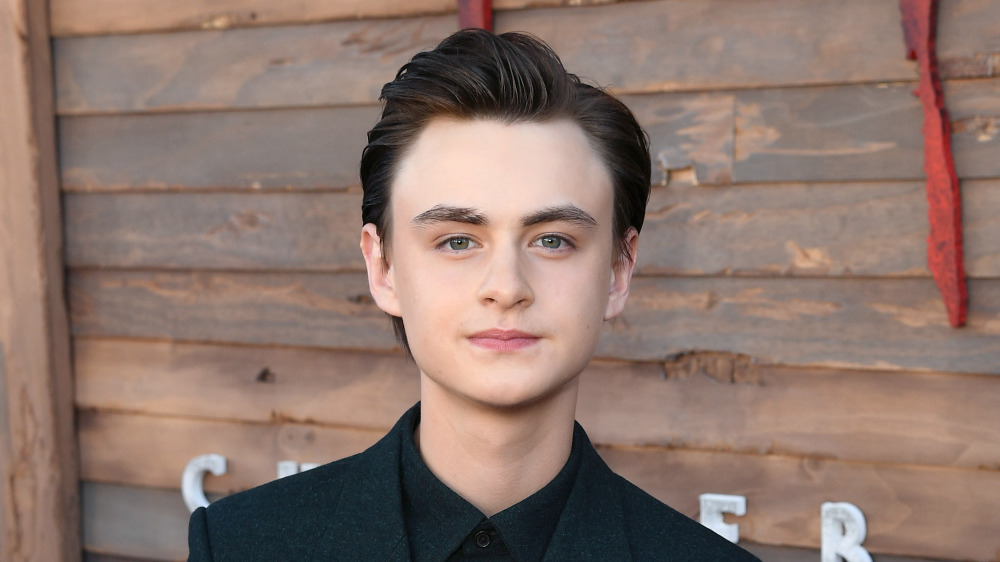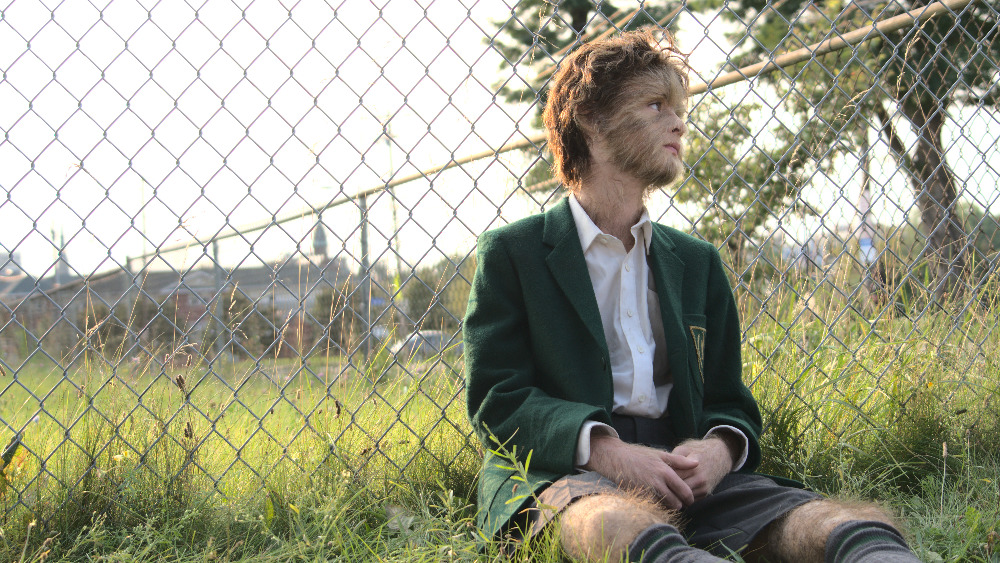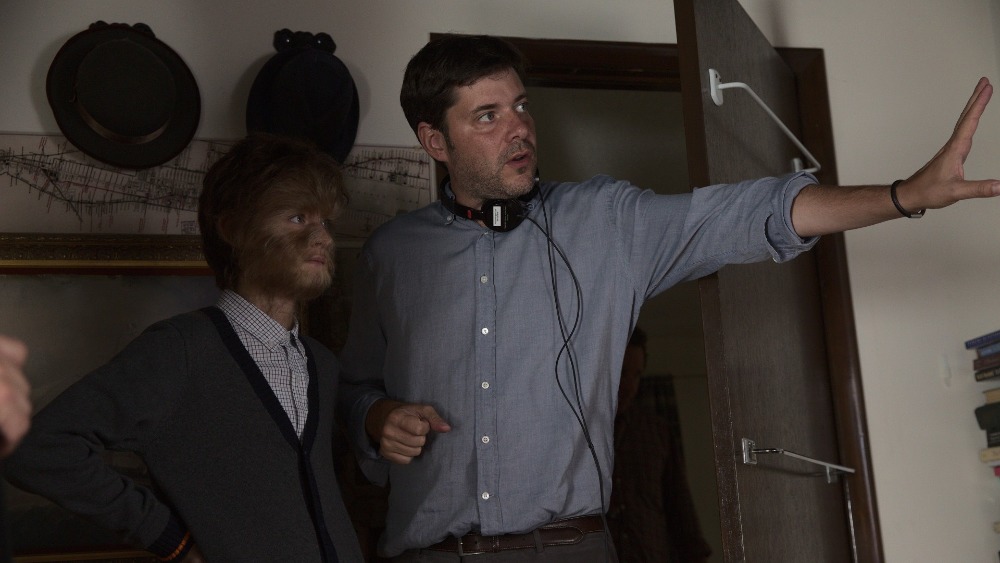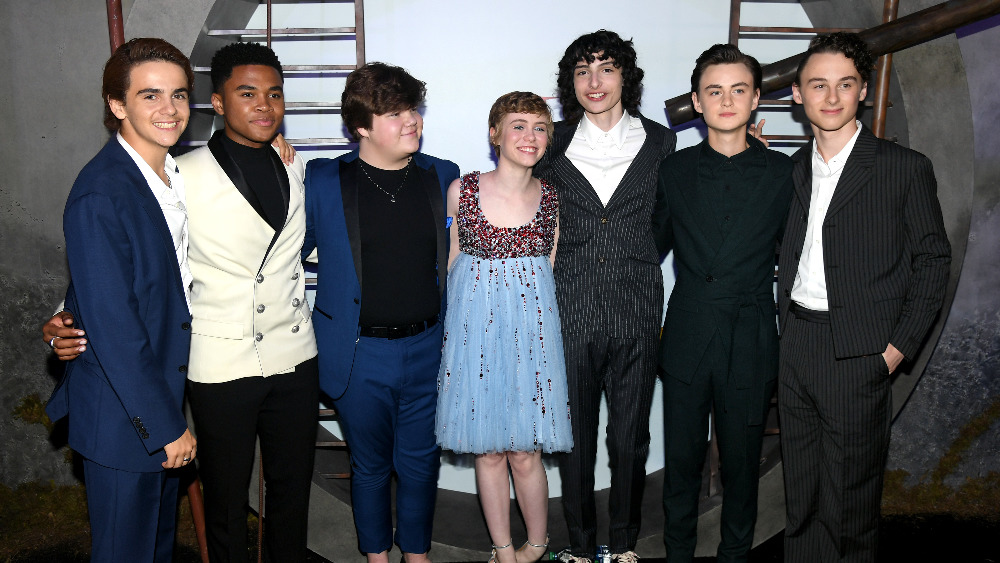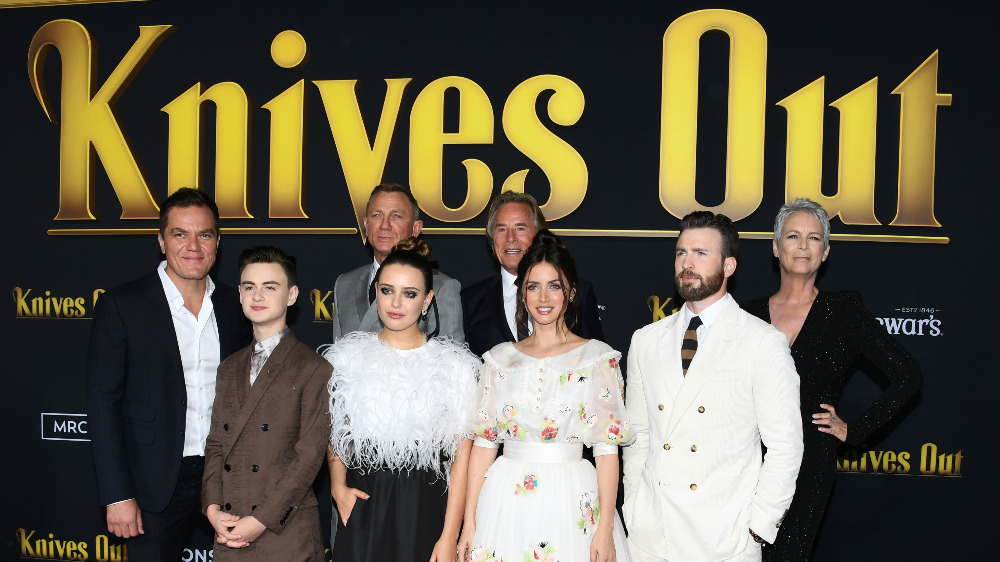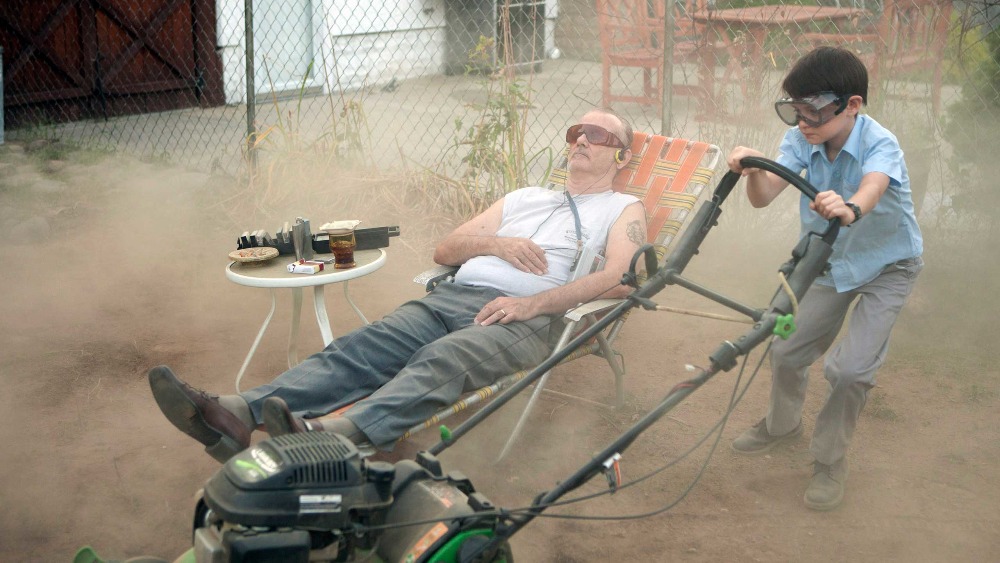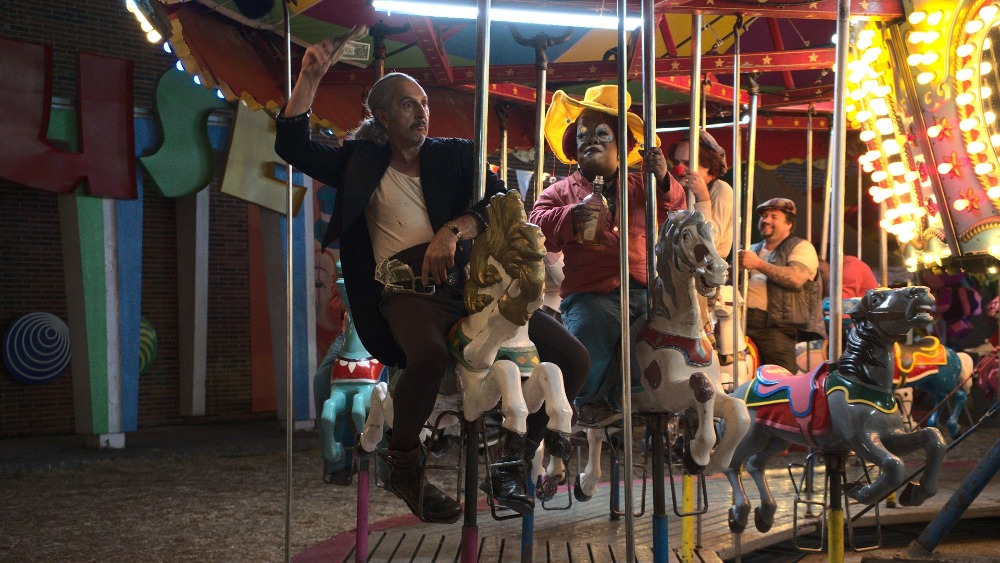Jaeden Martell Talks True Adventures Of Wolfboy, It, Knives Out, And More - Exclusive Interview
Six years after impressing audiences with his acclaimed feature film debut opposite Bill Murray and Melissa McCarthy in the comedy St. Vincent, actor Jaeden Martell has become one of the busiest teen actors working in the entertainment business, taking on major roles in such films as It, It Chapter Two, and Knives Out, as well as the streaming series Defending Jacob.
There's one big difference between his previous ensemble projects and his new film, director Martin Krejcí's The True Adventures of Wolfboy: Martell has found himself playing the lead role. If that weren't enough pressure, doing the work under heavy prosthetics, as he plays a teen with a rare medical malady that causes him to grow excessive amounts of hair on his face and body. Needless to say, it presented Martell with a new acting challenge.
In an exclusive interview with Looper, Martell talked about his work on The True Adventures of Wolfboy — in which his character comes to grips with his disease as he embarks on a search for the mother who abandoned him — as well as his blockbuster projects and the stars he's worked with along the way.
Coming to grips with an isolated character
Jaeden, thank you so much for doing this for such a wonderful film. The True Adventures of Wolfboy sounds like it could be scary, and the October 30 release date strategically positions it for Halloween. But it isn't a scary movie at all. In fact, it's quite heartfelt, considering congenital hypertrichosis is a real thing.
It is, yeah. It's about a boy with hypertrichosis and him sort of dealing with that, and Wolfboy is what people label him throughout the movie.
Sure. I think if there is a frightening element, it has to be the uncharted challenge you're facing as an actor. Looking into it, maybe you'll get a documentary on this condition, maybe a short film or whatever. I guess maybe the only thing I found in the mainstream was a CSI episode where a character had this condition. There's not a lot of material to refer to. So all of a sudden, you're playing a role that is not only unfamiliar to you as an actor, but to an audience. Certainly, it's got to be an interesting challenge.
Yeah, for sure. It was definitely interesting. And I think the great part about that, when reading the script, the thing that I was drawn to it was it's not informative. It doesn't teach you [about congenital hypertrichosis]. We never say the name of the condition in the movie. We never talk about it explicitly, but it teaches you a lot just by seeing how he deals with it, and how he feels in his insecurities and how other people treat him. So, it's more about the emotional aspect rather than the condition itself. I thought that was interesting. For me, understanding this condition came with putting the makeup on and seeing how other people would look at me with all this hair, just like [the characters in the film] look at Paul.
Right. What it also deals with is a theme that I think everybody can relate to on some level: the fear of being that outsider who could be subject to ridicule at every turn. I would imagine playing Paul and wearing the makeup all of a sudden gives you a different perspective of what truly the most outside of outsiders could go through.
Yeah, for sure. The characters are very unique, but everyone can relate to it. There is a theme of being an outsider. And while a lot of the audience members probably won't have hypertrichosis or won't relate to it on that extreme level, they'll definitely know what it's like to feel like you don't fit in, and I think that's an important message to talk about.
Learning a new discipline with the makeup process
The True Adventures of Wolfboy shows you how awful people can be. But what I do love is the humanity that Paul gets with his friendships with Aristiana [Sophie Gainnamore] and Rose [Eve Hewson]. I hope viewers watching those wonderful friendships — even though Rose is a rebellious troublemaker — that they will see that no matter how isolated a person can feel, you truly are never alone.
Yeah, I think you'll always be able to find people who have similar interests or relate to you on some level. I think sometimes it's harder for others to find those people. But I think if you look hard enough, you'll find people that make you feel comfortable and make you feel proud of yourself and that make you feel like you're loved. And I think it's important for your happiness to find those people.
You mentioned something about the makeup earlier. Obviously, you can now see how it looks great onscreen, but the process to get there — from sitting in the chair to going onto the set — how long was that? You've done a lot of wonderful things in your career, but I can't ever recall you in a role where you probably had to wear that much makeup, in terms of heavy prosthetics, especially.
No, for sure. It took about 3 1/2 hours every day to put it on, and then about 30 minutes to an hour to take it off. It was definitely an exhausting process. And just having that all on all day, it was interesting. Paul, obviously, throughout the story talks about how much he hates his fur. And he tried everything to burn it off and cut it off. It helped me sort of relate to his hatred for his fur. It definitely had an effect on me and made me, I don't want to say angrier, but a little bit more frustrated in general, just like Paul is in the beginning of the movie. [I felt that way] because it was so tight and it constrained my emotions, and I didn't know if I would be able to get my emotions across as an actor. So, I was really stressed about that.
Also, it was hard to eat, because it was so tight, and there were people constantly picking at me and fixing it. I definitely grew to sort of hate it, but in a way, love it, because it was such an educational experience, and at the same time [in the movie], Paul hated it so much. But throughout the story, when he meets people, when he meets the Aristiana and Rose, he eventually loves it and embraces it.
Forming a bond with the Losers Club
I have to mention the It films, because they were so compelling. They are so much more than horror films and have impacted so many people, largely due to the performances by you and your castmates in the first film. That really set the stage. Have you completely absorbed the success of those films yet?
I don't know. I think it's sort of a gradual process and not really like a, "Boom! Oh, wow, these [movies are huge]!" But definitely throughout the process of making the [first It] movie and it coming out, I found the great thing about all of us who did the movie, all of the kids, was that we didn't really care [about the movie becoming a hit], but in a good way. We obviously appreciate everyone who enjoyed the movie and that it had an impact. But I mean, for us, what made it so meaningful was the fact that we all met each other and that we got to share that experience of making that movie... Even if only two people watched it, we would've carried that experience in our hearts and in our minds forever.
I'm sure you found after sitting in the makeup chair with Wolfboy you thought of somebody else who had to sit in a chair for hours: Bill Skarsgård, to play Pennywise. Even though you might've seen this guy in between takes — I mean, he's a gnarly-looking clown — did it give you nightmares? It almost would have to.
[Pennywise] never gave me nightmares, but I've had lots of stress dreams about working in general and just being on set, and doing something wrong and forgetting a line or something. But as far as nightmares, I haven't had any about Bill Skarsgård. But yeah, doing this movie made me have more empathy for [Skarsgård's] process. Now that I know how restrictive everything is, it makes me appreciate... the crazy things that he did with his body and his face throughout the movies. It was awesome.
Getting an 'in' with the Knives Out cast
Obviously, you've had so many great opportunities to work with great casts. You have John Turturro, Chris Messina, and Chloë Sevigny in Wolfboy, and you had another great opportunity with such an amazing cast in Knives Out. What did you take away from that experience in particular? With It you were all the same age, but with Knives Out you were almost like a new kid on the block with all these veteran actors.
Well, the awesome thing is it felt like a similar experience shooting Knives Out and shooting It. I didn't feel younger than everyone. I didn't feel like I was respected less or anything. They were all so kind and humble, and I mean, they're all legends, so I got to learn so much from them just by watching them. The cool thing about the movie is I didn't have a lot of lines, so I got to be in the scene and just sit there on a couch and just watch all of these incredible legends do their job... and when they're not saying the lines, when they're just sitting there, I got to watch the little things they do. It was an incredible experience, and they all are just kind, special people, and you wouldn't expect that on a movie like that. You figure there'd be some sort of head-butting with egos, but there wasn't any of that.
I know Daniel Craig is coming back for a second one, and [writer-director] Rian Johnson has said that he's not going to have any of the other original cast members back. But if you get the opportunity, you've got to be there. Right?
Of course. But yeah, I'm just excited to watch it as a viewer.
Knives Out and Defending Jacob gave you the opportunity to work with Chris Evans. Now, of course, both of those films weren't Marvel projects, but Chris seems to be a Steve Rogers sort of good guy off the set. He really is a sort of all-American, Captain America-Steve Rogers sort of hero, isn't he?
Yeah, but he's cooler. [Smiles] He's less of a goody two-shoes, but he's still a good guy.
Did you have a chance to talk with him about Avengers stuff?
A little bit. I think the newest one came out sometime around when we were shooting, and we had to talk about his one scene, the "That's America's ass" scene [laughs]. It's a classic. He was doing press for Avengers during Defending Jacob.
A crash course in the Bill Murray school of comedy
You have proven you can act in so many different genres, from comedy and drama and mystery to horror and sci-fi. Is there any particular genre you favor at this juncture? Is there any genre that makes you think, "I'd like to do a few more in that play space"?
I don't necessarily favor a certain genre. I would like to do more comedy, because I think that's my, to be honest, I think that's like my weakest. I don't feel entirely comfortable with it. And whatever I don't feel comfortable with, I want to do more of, just to get better at it and to sort of push myself and try something new. So, yeah, So I want to do more comedy and just do movies that challenge me and do something new.
I remember seeing one of your early films involving comedy, one of your first performances, in St. Vincent, opposite Bill Murray and Melissa McCarthy — and being so impressed because it showed me how you could hold your own with two of the funniest people on the planet. What did you take from that experience, working with Bill and Melissa, and how did you apply it to future roles?
That was the first movie that I did, and it was one of the most amazing experiences that I'll never forget, just watching them work. Being in one scene with Bill Murray is an incredible learning experience, but doing a whole movie and working with him every day for three months is worth a whole college education. I really appreciated it.
Like I said before, I don't feel entirely comfortable with comedy, but I think what they do is more than comedy. They're talented people and they work very, very hard, and I think that's the greatest thing that I took away from them: how much effort they put into acting. Because for my first movie, if I worked with someone who didn't work as hard, that's what I would've expected out of all actors, and maybe that would have affected how I work. But I got to see these people, and everyone on that set put everything they had into their roles and their jobs, so I had to keep up with them.
About Melissa McCarthy — after seeing her in Bridesmaids, it was great watching her in St. Vincent because you got to see her range. Yes, she was funny in St. Vincent, but she wasn't outlandish. It was really a measured role for her. So you really got the best of both worlds doing the film, seeing the range of these great comedic actors.
Yeah, for sure. There's more than just [funny stuff]. They don't just crack jokes all the time. They have control over their emotions, like any great actor does.
Acting under the tutelage of Turturro
Getting back to Wolfboy, I have to mention John Turturro. He is so passionate about what he does. To have an opportunity to be in scenes with him must have been wonderful.
It was incredible. I mean, he would come on set and completely change the whole tone, and his character was so out of this world. Seeing him delve into that, seeing him make every take different and seeing how he reacts to the scenario that he's put in, and the way he's constantly changing and thinking, I found [it to be] very awesome. I want to be more like that and be able to think on the fly... I don't know if he was trained or not, he's the definition of a professional actor, I feel like I learned a lot.
Well, only he could pull off that dancing thing that he does in the end credits. It just shows you just the immense amount of talent this guy has, and he is obviously generous with the scenes he has with you. It's about teamwork and you could really see it between the two of you on the film.
That's great. He definitely wanted everyone to succeed. And like you said, his tone was infectious to everybody. By him being louder, it made me louder and angrier, and it sort of heightened by emotions just by being in the room with him and by him screaming and yelling. And his character's so intimidating, but it had a real impact on me and my performance.
